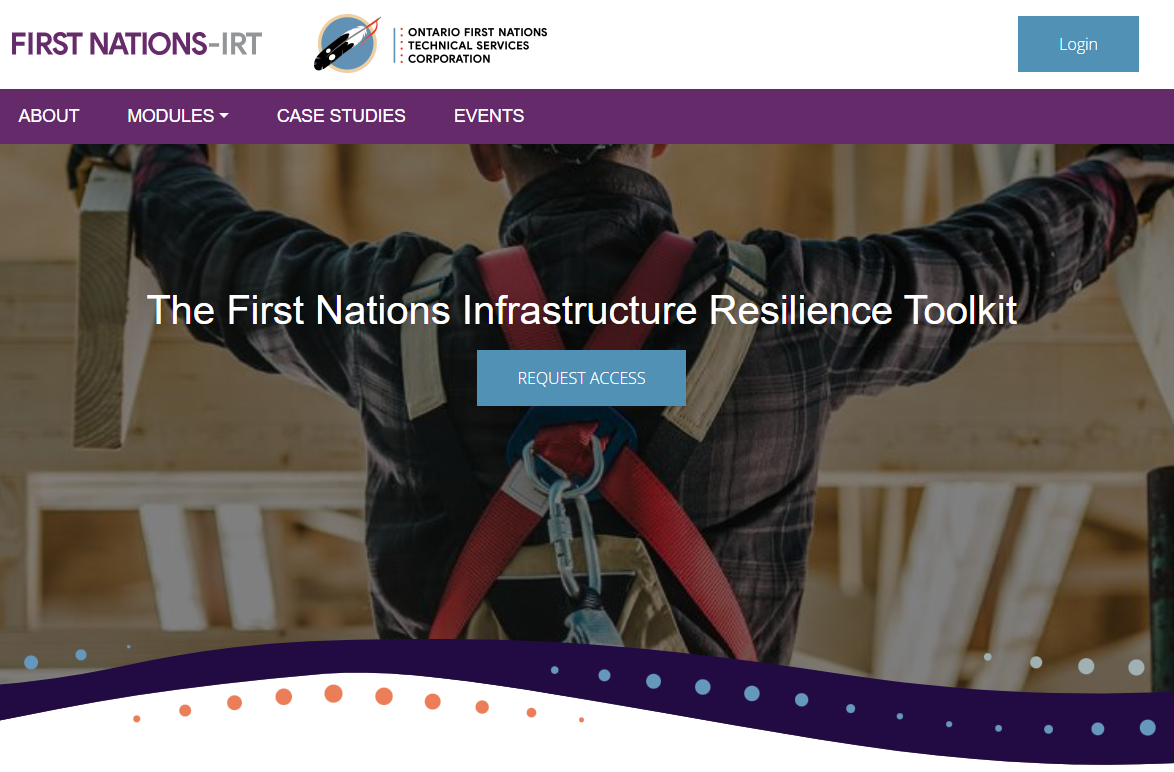OFNTSC's Asset Management (Formerly Operations & Maintenance) program is helpful in many aspects across our First Nations communities. Building awareness on Asset Management best-practice improves the efficiency of First Nations facility staff, enhances operational procedures, and initiates maintenance practices that help reduce unexpected down time & facility costs.
The Asset Management program helps builds capacity on asset management principles and fundamentals. This includes introducing Asset Management Plans (AMP) designed to provide First Nations with a systematic approach to the governance and best practices over the full life-cycle of their assets.
The program helps First Nations assess the vulnerability and climate risk to their infrastructure due to extreme climate events. Once identified, these risks can be incorporated in the life-cycle analysis of their Asset Management Plans.
By implementing effective operation, maintenance and asset management best practices, First Nations will have better procedures to protect community facilities over their full life-cycle.
First Nations Infrastructure Resilience Toolkit (FN-IRT) & Website!
The Ontario First Nations Technical Services Corporation (OFNTSC) is very pleased to announce that after three years in the making, the award-winning “First Nations Infrastructure Resilience Toolkit” (FN-IRT, or Toolkit) is completed and ready to use by First Nation communities.

The FN-IRT, or Toolkit, allows First Nation communities to assess the vulnerability of their infrastructure, buildings, and facilities due to extreme weather. The Toolkit enables communities to forecast critical climate-related risks over the lifecycle of their assets, and provides guidance on how these risks can be integrated into long-term planning.
The Toolkit also helps First Nations develop and implement sound asset management practices to forecast capital replacement and, operations and maintenance (O&M) investment needs, over the lifecycle of their assets. This allows First Nations to maximize the service life of their assets, while maintaining or improving levels of service.
In 2019, the toolkit won a Canadian Consulting Engineering Award.
Click on the button below to visit the First Nations Infrastructure Resilience Toolkit Website to gain access to the Toolkit!
First Nations Infrastructure Resilience Toolkit Workshops
In 2020-2021, the Ontario First Nations Technical Services Corporation (OFNTSC) delivered training workshops and information sessions on the Infrastructure Resilience Toolkit (FN-IRT or Toolkit) to First Nations, Tribal Councils and Crown-Indigenous Relations and Northern Affairs Canada (CIRNAC).
The workshops provided an overview of Module 1 – Data Structure and Sources, but focused primarily on Module 2 – Climate Risks Assessment and Module 3 – Asset Management Plans.
To inquire about participating in future workshops, email Elmer Lickers, at elickers@ofntsc.org
North Shore Tribal Council "Asset Management Initiative"
Ontario First Nations Technical Services Corporation (OFNTSC) and Mamaweswen, The North Shore Tribal Council (NSTC), have partnered to develop Asset Management (AM) Plans for all seven NSTC communities.
Asset Condition Reporting System
The Asset Condition Reporting System, (ACRS), was developed by Indigenous Services Canada (ISC) in response to the Treasury Board's request for a better method of determining asset recapitalization requirements, i.e., based on actual asset condition, rather than being formula driven.
Upcoming Events
Staff
This service provides:
- Advisory support to compile and comply with federal government reporting systems: Integrated Capital Management System (ICMS), Asset Conditioning Reporting System (ACRS), ACRS Terms of Reference, Capital Management Database (CMDB), Maintenance Management Systems (MMS) and Tangible Capital Assets (TCA).
- Advisory support on Federal Government O&M policies & reporting requirements
- Advisory support on PS3150 financial requirements on Tangible Capital Assets (TCA)
- Advice on how to inventory, track, assess and evaluations community capital assets
- Advice on how to do short-long term planning through Asset Management Plans
- Advice on climate risk assessments using the FN Infrastructure Resilience Toolkit
- Methods that help identify the required level of O&M funding for community assets
